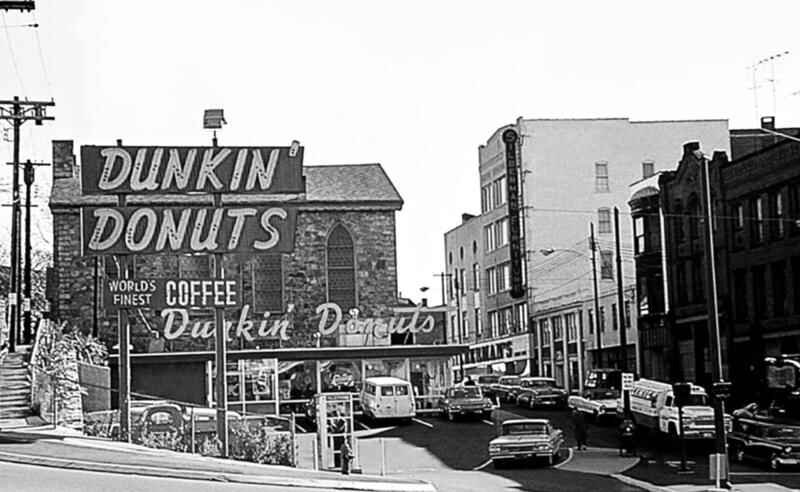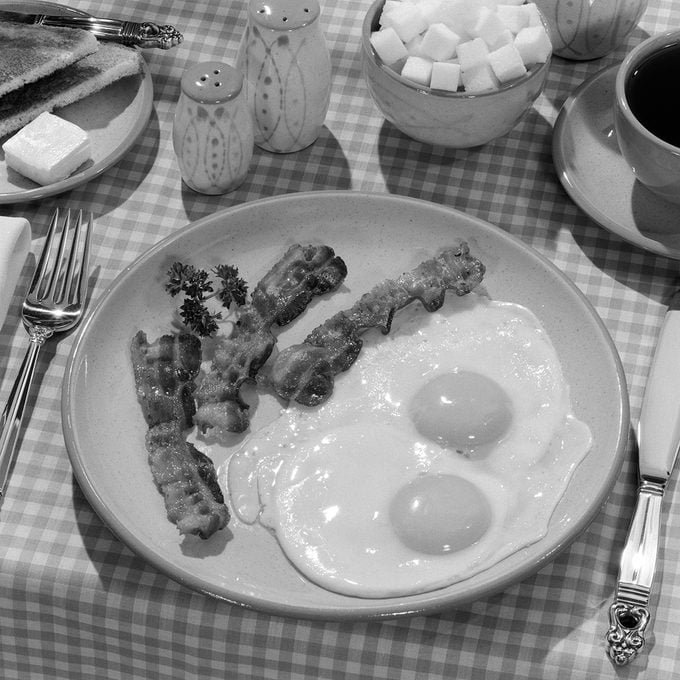The Smell of Home
First Dunkin Donuts in Norwich, CT / Photo Courtesy Unknown
In 1688, coffee was transported from the Dutch to New Amsterdam (now New York). “Coffee plays a fundamental role in the lives of people all over the world. To succeed, cafes must realize that customers value coffee as something deeper than a drink. Coffee offers a moment of everyday luxury, something to slow down and savor, and an opportunity to relax in a comfortable environment. ” [1] As Carl Ray (1944-2014) expressed, “You had that Maxwell House coffee and when you woke up in the morning you smelled that and you smelled ham. And the sights, we, we had this--there is this area where we would go. It was--we call it "the bottom" and you know in the summertime when the, the, the water levels get low we would always go to "the bottom." We had a well in "the bottom;" we had a well at the house, and in "the bottom" we had the creek and this great white sand I used to go play in as a kid, so, under this big hickory nut tree. That was my favorite spot.” [2]
Mathematician Linda Hayden “In the kitchen, there was one in the kitchen. And there was always a coffee pot sitting on the back of the stove. And that coffee would be, they'd make it in the morning and it would just, you know, first thing you'd smell would be the coffee. And they'd drink it all day long. That would be some pretty strong coffee. And to this day, the first thing I do when I get up in the morning is make some coffee. And people in my house don't drink coffee, except for me. So, I make a half a pot, but every single day I make a pot of coffee. It's just sort of my connection to the world, and it's, yeah, it's decaf. So, it's not the caffeine that gives me, you know, the rush or whatever. It's the warmth that's good and the aroma is good. And I just think it is just kind of my link back to that time. Coffee on the stove, I remember. I remember the nights when we would all sleep in that one bed. It was Grandmama and myself and Aunt Vivian, and sometimes Stephanie. And how we would--if you had to get up at night, then there was no indoor plumbing for a long time. So, there was a jar, a jug, that we'd have to use. And then somebody would have to take that out the next day, of course, in the morning.” [3]
Black Woman Drinking Coffee Circa 1940 / Photo Courtesy Unknown
Writer Alice Randall relayed, “And that was a smell of my childhood. Cooking, my grandfather [William Randall] made cornbread and coffee every day of the week except for Sunday when my grandmother cooked. So cornbread and they would make it in the skillet in the oven with bacon grease beforehand. We drank Tang of all strange things, it was considered being modern. There came a moment they--not my grandmother's house but my father--they loved TV dinners 'cause they thought it was modern. And for people who had grown up on farms and every--all the food was fresh, they liked this modern food.” [4]
Broadcast journalist Art Fennell added, “ But I remember all of those smells and sounds very vividly, particularly the roosters crowing, and the chickens, and, and the--and the cow, the freshly cut grass, which I still enjoy even now. I still enjoy going out and cutting grass, and getting my hands working in the soil and so forth, and planting the crops, the vegetable garden and all of those types of things. I remember the smell of coffee in the morning, which just signified the beginning of the day--oh, and the bacon cooking in the griddle. 'Cause you have to understand, for us any part of the pig was gonna be part of our diet. And so good bacon, or fresh sausage, or pudding, or ham from, from, from our pig that we'd slaughter, that was going to feed us for a good long time. So it made for good eating. Now we think about it now, and then you know, you try to get away from pork. A lot of people don't touch pork and so forth, but the, the, the pig was always good to us. Now, now at this stage in my life, I still eat pork. I don't eat that stuff nearly as much as I once did, but I still appreciate it.” [5]
Breakfast Delight Steel Cut Blended Coffee / Photo Courtesy Unknown
Civil rights activist Frank Smith talks about black coffee and adds, “Well, I'd guess you'd have to say my grandmother's [Emilou Smith] pot cooking on the stove. Well more than that, my grandfather [Wade Smith]--I got to tell you this, he used to drink coffee that was so strong, that in order to get this coffee strong enough for him, my grandmother would leave coffee grinds in the pot all week long, so long about Friday or Saturday, you could smell it all around there (laughs). It was a great smell, and created such a nice environment. So, yeah, coffee smells….You could put a spoon in my grandfather's coffee. It wouldn't even go to the bottom (laughs).” [6]
Television anchor Carol Randolph-Jasmine explains that “The smells would always be coffee in the morning and my room was right over the kitchen, so I could smell the coffee when my mother [Clarice Dreer Davis] would do the coffee and bacon and whatever in the morning, cause she insisted on all of us having a full breakfast before we would go out to school and whatever else. To this day I can't eat a full breakfast and move, you know, I do lighter breakfasts.” [7]
Standard Breakfast with Coffee and Bacon / Photo Courtesy Unknown
Artistic director Cleo Parker Robinson also explains that “Because, the--what--the famous coffee hour is what we had. We had these famous coffee hours, no matter--we didn't drink coffee, but, when Daddy [Jonathon Parker] says, "We're gonna have a 'coffee hour." That meant, everybody stopped, and we were going to go over the script. We're going to talk about these characters, and we're going to hear who they are, and we're going to see how real they are.” [8]
In summary, coffee is a symbol and smell of home for many in The HistoryMakers Digital Archive. Its nostalgic qualities and strong smell has impacted many, and the effects will last throughout history.
Citations
Drake, Coral. “What Do Your Customers Value about Coffee?” Revel System Blog, March 9, 2023. https://blog.revelsystems.com/what-customers-value-about-coffee#:~:text=Coffee%20plays%20a%20fundamental%20role,relax%20in%20a%20comfortable%20environment.
Carl Ray (The HistoryMakers A2002.039), interviewed by Julieanna L. Richardson, March 28, 2002, The HistoryMakers Digital Archive. Session 1, tape 1, story 9, Carl Ray describes the sights, sounds and smells of his childhood
https://da.thehistorymakers.org/story/51051;q=COFFEE%20%2B%20MORNINGLinda Hayden (The HistoryMakers A2013.044), interviewed by Larry Crowe, February 25, 2013, The HistoryMakers Digital Archive. Session 1, tape 2, story 1, Linda Hayden describes the sights, sounds and smells of growing up
https://da.thehistorymakers.org/story/25710;q=COFFEE%20%2B%20MORNINGAlice Randall (The HistoryMakers A2007.094), interviewed by Larry Crowe, March 17, 2007, The HistoryMakers Digital Archive. Session 1, tape 2, story 9, Alice Randall describes the sights, sounds and smells of her childhood
https://da.thehistorymakers.org/story/599144;q=%22COFFEE%22%20%2B%20%22CHILDHOOD%22Art Fennell (The HistoryMakers A2014.173), interviewed by Larry Crowe, June 12, 2014, The HistoryMakers Digital Archive. Session 1, tape 2, story 9, Art Fennell describes the sights, sounds and smells of his childhood
https://da.thehistorymakers.org/story/671203;q=%22COFFEE%22%20%2B%20%22CHILDHOOD%22Frank Smith (The HistoryMakers A2004.257), interviewed by Racine Tucker Hamilton, December 13, 2004, The HistoryMakers Digital Archive. Session 1, tape 2, story 1, Frank Smith recalls the sights, smells and sounds of his childhood
https://da.thehistorymakers.org/story/19862;q=COFFEECarol Randolph-Jasmine (The HistoryMakers A2013.335), interviewed by Larry Crowe, December 5, 2013, The HistoryMakers Digital Archive. Session 1, tape 1, story 13, Carol Randolph-Jasmine describes the sights, sounds, and smells of her childhood
https://da.thehistorymakers.org/story/117610;q=COFFEECleo Parker Robinson (The HistoryMakers A2002.121), interviewed by Larry Crowe, June 21, 2002, The HistoryMakers Digital Archive. Session 1, tape 2, story 3, Cleo Parker Robinson talks fondly of her father as her role model
https://da.thehistorymakers.org/story/12398;q=coffee




